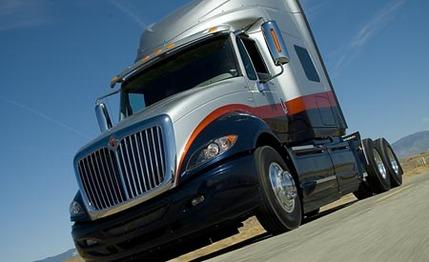 Short Take Road Test
Short Take Road Test
Driving this 20,680-pound International ProStar Limited isn't that difficult. You step on the weighty clutch, jam the 13-speed Fuller transmission with shifter-selectable low and high ranges into first, let out the clutch, upshift at about 1500 rpm-redline is 2000 on the 912-cubic-inch Cummins turbo-diesel-and keep it between the lines with reasonably tight steering until the 225 gallons of fuel are used up, or for about 1800 miles, assuming a typical 60,000-pound load. In fact, the hardest thing about being a ProStar driver might be choosing between the Shrimp & Cheddar Grits and the Pancho Villa's Burrito at the Flying J truck stop.
Okay, it's a bit tougher than that. But the most earnest thinking in trucking these days isn't behind the wheel; it's under the hood and cab, where the hauling industry is being forced by government regulations to clean up its gases, burritos notwithstanding. The $186,240 ProStar pictured here-fitted with a diesel-soot-trapping filter, fuel-saving auxiliary-power system, cost-saving and maintenance-easing design, and wind-cleaving body-is the rig of the future.
Its arrival comes none too soon. Despite tough emissions laws for cars, heavy diesel trucks roar down the interstates trailing charcoal-black. Nearly all the 3.51 million trucks on our highways defined by the U.S. Department of Energy as Class 8 (above 33,000 pounds gross vehicle weight) spew untreated diesel exhaust. Gasoline engines burn cleaner, but they can't match the efficiency or durability of a diesel when cruising the highway, so all big rigs run oil burners. The heavy-truck fleet generates more than twice as many carcinogenic soot particulates as the roughly 200 million light vehicles on the road combined, according to a 1998 Environmental Protection Agency study. Until this year, heavy trucks were not even required to recycle or filter crankcase blow-by, a requirement on U.S.-sold passenger cars since 1963.